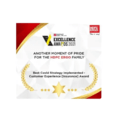

Eat Healthy As You Age
- Overview
- Importance
- Benefits
- Habit Changes with Age
- Recommended Calories
- Healthy Diet
- Cope with Dietary Changes
- Overcome Obstacles
- Tips
- Conclusion
- FAQs
Overview
A well-balanced diet with a restricted calorie count is necessary as you grow older. The biggest challenge every person faces on reaching their midlife is the reduction in basal metabolic rate (BMR), which decreases the rate at which the body burns calories. Hence, as you age, you must eat healthy and be wise in your food choice. Eating well not only helps keep diseases at bay, but it can also be the key to a positive outlook and staying emotionally balanced.
Importance of Healthy Meals
With growing age, bringing discipline in what you eat is very important. The biggest challenge is to meet the daily requirement of all necessary micronutrients and macronutrients in fewer amounts of calories. Hence, it is necessary to have healthy meals as you age and avoid foods that are high in glycemic index (GI) value that spike up the blood sugar level.
Also, eating clean as you age can help reduce the risk of type 2 diabetes, heart diseases and high blood pressure. Wholesome meal gives energy and helps a person gain confidence and self-esteem. It’s all connected; when your body feels good, you feel happier inside and out.
Benefits of Healthy Eating as You Age
There is no specific age for healthy eating as a nutritious diet is necessary for all age groups. However, with increase in age and body mass index (BMI) type, the calorie requirement per day differs. One big advantage of eating healthy as you age is that it helps reduce the risk of developing chronic health conditions, such as heart disease and diabetes.
Following a well-balanced diet as you age helps in the following ways:
- Maintain Muscle Mass: Protein-rich diet coupled with some basic physical exercises can help maintain muscle mass and avoid severe atrophy (muscle loss). Healthy eating can also help the person stay stronger in their older age.
- Live Longer: Good nutrition helps boost immunity by fighting against free radicals in the body and controlling weight, thereby avoiding many chronic diseases.
- Sharpen Your Mind: People who eat fruits, fish and nuts packed with omega-3 fatty acids and other necessary micronutrients can improve cognitive health, increase focus and decrease their risk of Alzheimer’s disease.
- Improve Bone Density: Vitamin- D, zinc, calcium and magnesium are essential for stronger bones. As you grow older, the body’s skin gets thinner, decreasing its capacity to absorb vitamin D from sun rays. Hence, older adults who eat foods rich in magnesium, zinc and calcium can help maintain their bony density and thereby improve its strength.
Need and Habit Changes with Age
When people grow older, their nutritional needs, appetite, and food habits can change in several ways.

- Calories: It is very necessary to be on a low calorie diet as you age to maintain a healthy weight. Eating more calories than you burn leads to weight gain. In addition, when a person grows older, they may become less mobile and burn fewer calories through physical activity, thereby leading to atrophy (muscle loss). This causes the metabolism to slow down, thereby lowering the caloric needs.
- Appetite: Many people experience a loss of appetite with an increase in age where the sense of taste and smell diminishes. If you’re burning fewer calories through physical activity, eating less may not be a problem. However, you need to meet daily intake of vitamins, minerals, proteins, fibres and other nutrients to maintain healthy organs, muscles, and bones. Not getting adequate nutrition can lead to malnutrition and health problems.

- Medical Conditions: When you grow older, you become more susceptible to chronic health problems, such as diabetes, high cholesterol, high blood pressure and osteoporosis. To help prevent or treat these conditions, your doctor may recommend changes to your diet. Some older adults become allergic to peppers, onions, dairy products, and spicy foods. You may need to cut some of these foods out of your diet.
- Medications: Older adults have to take medications to manage chronic health conditions. Some medications can affect their appetite and also interact with certain foods and nutritional supplements. You also need to maintain a steady level of vitamin K in your diet. You can get vitamin K from eating plenty of spinach, kale, or other greens leafy vegetables.
- Immune System: The immune system of a person weakens with age. This raises the risk of food-borne illness, or food poisoning. Proper food safety techniques are important at every age. However, older adults need to take extra precaution while selecting the type of food for their meal. For example, the doctor may recommend an older adult to avoid foods with raw eggs, such as homemade mayonnaise or Caesar salad dressing.
How Many Calories Do Older Adults Need?
According to the National Institute of Ageing, a woman over 50 who is not physically active needs about 1600 calories a day. If she is somewhat physically active, she will need about 1800 calories a day.

On the other hand, a man over 50 who is not physically active needs about 2000 calories a day. However, if he is somewhat physically active, he will need about 2200-2400 calories a day.
How to Create a Healthy Diet for Seniors?
For senior age people, it is necessary to eat whole food and avoid processed foods as much as possible. These tips are a good place to start:
- Eat plenty of fruit and vegetables: Old age people should have fruits in between their meals whenever possible. Fruits are rich in fibers that can lower the risk of heart disease, stroke, diabetes and also helps in improving the health of your skin and losing weight. As you age, your digestion becomes less efficient, so it’s important to include enough fiber in your diet. Older adults are advised to have antioxidant-rich leafy greens, such as kale, spinach, broccoli, and colourful vegetables such as carrots and squash when it comes to veggies.
- Choose calcium for bone health: Strong bone health depends on adequate calcium intake, which help prevent osteoporosis and bone fractures. Good sources include yoghurt, milk, cheese or non-dairy products such as tofu, broccoli, almonds, and kale.
- Go for “good fat” not “no fat”: Rather than completely eradicating fat from your diet, focus on having healthy fats. For example, Omega-3, monounsaturated and polyunsaturated are healthy fats that improve heart health and memory.
- Vary your sources of protein: As you age, eating enough high-quality protein can help you stay strong, boost your resistance to stress, anxiety, and depression, and help maintain muscle mass if you do some exercise. However, eating too much protein from processed meat products may increase your risk of heart disease, cancer, and other health problems. Hence, instead of relying on having red meat, try including more fish, beans, peas, eggs, nuts, and seeds in your diet.
- Be smart about carbs: Go for whole grains instead of processed white flour for more nutrients and fiber and cut down on refined carbs. While our senses of taste and smell diminish with age, we retain the ability to distinguish sweet tastes the longest, leading many older people to consume more sugar and refined carbs than is healthy. In addition, unlike complex carbs rich in fiber, refined or simple carbs are high in glycemic index (GI) value. It can lead to a dramatic spike in blood sugar, followed by a rapid crash that leaves you feeling hungry and prone to overeating.
Cope with Dietary Needs as you Age
As you age, every part of life brings changes and alterations to your body. Understanding these changes will help you take control of your nutritional and dietary requirements and make necessary adjustments.
Physical changes that can affect your diet
- Metabolism: Over the age of 40, body’s metabolism slows down and we often become less physically active. Hence it is even more important to adopt healthy eating and fitness habits to avoid becoming overweight.
- Weakened Senses: Older adults tend to lose their taste sensations for instance sensitivity to salty and bitter tastes first. Hence, there salt and sugar intake tend to increase which can give rise to other health issues. so you may be inclined to salt your food more heavily than before—even though older adults need less salt than younger people. Use herbs, spices, and healthy oils—like olive oil—to season food instead of salt.
- Medications & Other Illnesses: Some health problems or medications can negatively influence appetite or affect taste, again leading older adults to consume too much sugar or salt.
- Digestion: Older adults commonly face digestive issues which may make it difficult for the body to process certain vitamins and minerals, such as B12, B6, and folic acid, which are necessary to maintain mental alertness and good circulation. Increase intake of fiber rich foods and consult your doctor about possible supplements.
Lifestyle Changes that can Affect Your Diet

- Loneliness and depression: When a person is depressed, he/she can overeat due to the rising cortisol level in the body. Sharing meals with other people can be an effective antidote to loneliness. Reach out to your friend and family members, discuss your problems, have a positive approach towards your life.

- Divorce: If you’re newly single, you may not be motivated to eat healthy or eat anything at all. However, remember self-love is an important thing and you should look forward to your life in a positive way. Leading a healthy lifestyle by eating nutritious food is very important in old age.

- Living on a limited budget: With smart planning, it is possible to enjoy healthy food that is cheap. By eliminating junk and processed foods, you can save money to enjoy healthier and high quality food.
Overcome Obstacles to Eating Well as an Older Adult
Be it any age, it is never easy to get into the habit of eating healthy food. It takes a lot of dedication to choose a nutritious meal over a flashy high-calorie unhealthy dish. If you’re having trouble getting started on a healthy eating plan, these tips can help:
- Boost A Low Appetite: It is advisable to check with your doctor and see if loss of appetite is due to medication. Change in dosage of medication can help built up an appetite. Try natural flavor enhancers such as olive oil, vinegar, garlic, onions, ginger, and spices to boost your appetite.
- Cope With Chewing Difficulty: Older adults can have smoothies made with fresh fruit, yoghurt and vegetables that do not involve much of chewing and are good for health. Soft food for elderly can help body get the necessary nutrients without much effort. They can also have steamed veggies and soft food such as couscous, rice, and yogurt. Consult your dentist to make sure your dentures are properly fitted.
- Deal With A Dry Mouth:Drink at least 8–10 glasses of water each day to stay hydrated. Have a glass of water before every meal and add sauces to moisten your food.
Tips for Healthy Eating
When a person adapts to a healthy lifestyle, he/she should stick to it for the entire life. Eating healthy is not that tough, all you need is bit of a motivation and slight discipline. Here are some tips for staying on course:
- Include Variety: There are variety of healthy meals, don’t just stick to one single breakfast or a particular dish for lunch. Try eating and cooking different variety of food as eating same food daily can lead to boredom.
- Make Every Meal Do-Able: Eating healthy doesn’t mean to have some very fancy meal. You can keep it simple. Stocking the pantry and fridge with wholesome choices will make preparing quick, tasty meals easier.
- Set Mealtime Mood: While having a healthy meal play some music, or eat outside or by a window when possible. Tidying yourself and your space will help you enjoy the moment.
- Break Habits: While eating, ensure to leave all your stress behind and concentrate on the food. Your mealtime can become a quality time of the day if you eat along with your friend or spouse by having a good conversation with them.
- Never Give Up: There might be a time when you get bored of bland, simple food and probably think of quitting healthy eating. Before doing that, just think about why you started this journey; remember, nutritious eating does give a good result, but one has to have that patience.
Conclusion
Healthy eating is an important part of healthy aging. As with exercise, eating well is not just about weight. Having a healthy diet can help support muscles and strengthen bones, which can help with balance and independence. A nutritious diet involving a variety of fresh fruits and vegetables, whole grains, healthy fats, and lean proteins also can help boost immunity and lower the risk of certain health problems
Frequently Asked Questions on Eating Well with Age
1. What type of foods you should eat for healthy ageing?
Fruits, vegetables, low-fat dairy products, fishes high in omega-3 fatty acids, nuts and beans should be part of your meal frequently for healthy ageing. These foods help maintain weight and improve heart health, reducing the risk of cardiovascular disease.
2. What type of foods can make you age faster?
A constant diet of food rich in saturated fats and simple carbohydrates is a huge cause of premature ageing. Also, it is advisable to avoid eating processed foods, red meats and refined flour, which cause inflammation in your body and leads to wrinkle formation.
3. Is Banana suitable for older adults?
Bananas might be high in carbohydrates, but older adults can have at least one every day for healthy ageing. In addition, this fruit is rich in potassium, which can regulate blood pressure heart rate, and due to the presence of fiber it also helps improve gastrointestinal health.
Source: Helpguide, Nia.nih
Get a right Health Insurance today & protect your savings from unexpected medical expenses.
Eating healthy, balanced diet as you age ensures you stay on top of your health game. As you make diet plans to stay fit, prioritize having a Senior Citizen Health insurance plan on your stay-healthy list. This can save you from medical expenses in times of hospitalisation or sickness.
Disclaimer: This blog provides general information and discussions about health and related subjects. The information and other content provided in this blog, website or in any linked materials are not intended and should not be considered, or used as a substitute for, medical advice, diagnosis or treatment. Kindly contact your Doctor before starting a new medicine or health regime.

/well-being-in-old-age_s.png)
/old-age_s.png)
/elderly-diseases_sd973bacc7e3d41b4ab609cf9364d5a8b.jpg)












 Car Insurance
Car Insurance  Bike/Two Wheeler Insurance
Bike/Two Wheeler Insurance  Health Insurance
Health Insurance  Pet Insurance
Pet Insurance  Travel Insurance
Travel Insurance  Home Insurance
Home Insurance  Cyber Insurance
Cyber Insurance  Third Party Vehicle Ins.
Third Party Vehicle Ins.  Tractor Insurance
Tractor Insurance  Goods Carrying Vehicle Ins.
Goods Carrying Vehicle Ins.  Passenger Carrying Vehicle Ins.
Passenger Carrying Vehicle Ins.  Compulsory Personal Accident Insurance
Compulsory Personal Accident Insurance  Travel Insurance
Travel Insurance  Rural
Rural  Critical illness Insurance
Critical illness Insurance 










